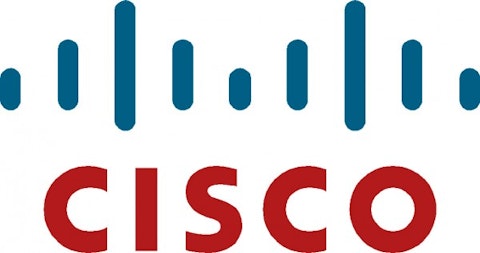With the tech bubble being a distant memory, large tech companies are no longer partying like its 1999. But this does not mean that the glory days are over. For names such as Palo Alto Networks Inc (NYSE:PANW), 2013 signals the beginning. For others, such as Cisco Systems, Inc. (NASDAQ:CSCO), it’s time to rejuvenate. Granted, Cisco is no longer the market darling that it once was. And the company understands this.
The case for $30 per share
However, the network giant also understands that it doesn’t need to be. After years of struggles, Cisco has put together a string of seven consecutive earnings beats. Remarkably, the company still carries a valuation that suggests Wall Street isn’t expecting much. At least not compared to, say, Juniper Networks, Inc. (NYSE:JNPR), which carries a P/E that is five times greater than Cisco’s.

While Leopold was correct in his description, equal evidence suggests that his price target is short by 20%. I believe for several reasons that $30 is equally realistic. For instance, in Cisco’s fiscal Q1 report, profits surged 11%, which helped raise its cash pile to $45 billion.
The company’s cash position is important to note here because quite a bit of my assumptions are based on its free cash flow projections. In that regard, when applying a modest 3% to 4% FCF growth above 2012 levels, it supports a $30 fair market value. Meanwhile, it seems that the market is discounting this metric in favor of top line growth.
Pioneering the era of new deals
However, Cisco appreciates that as well. To that end, Cisco has acquired several companies to help drive the top line. These include paying $141 million in cash for Cariden, another $1.2 billion for Meraki and most recently, the company acquired BroadHop, a provider of next–generation policy control and service management technologyfor carrier networks.
Although the terms of the deal for BroadHop remain unknown, it highlights how Cisco plans to leave no stone unturned to produce the growth investors crave. Essentially, the company is demonstrating how it plans to use its capital in ways that increase shareholder value. Why then did Cisco recently guide for only 3.5% year over year growth? That was a clue.
In my opinion, it means that the company is not be done doing deals since that outlook is below the 6% target that has been a part of Cisco’s long-term plans. Not especially since the cloud market is expected to grow to $177 billion over the next three years. It would be foolish for Cisco not to execute in that direction and look for competitive advantages. But Cisco is well aware of what’s going on. Its Q1 results revealed what has been feared for quite some time.
For instance, Cisco has been struggling to revive its primary routing and switching businesses, an area where it is being outperformed by Juniper. The company realizes that its customers are migrating quicker toward the cloud as evident by its 12% increase in its service revenue. Meanwhile, Cisco’s hardware business has declined sequentially and year over year. Essentially, the company sees the writing on the wall, and it reads “software is the new hardware.”
To that end, Cisco has partnered with virtualization/cloud giant Citrix Systems, Inc. (NASDAQ:CTXS), a move that caught many investors off-guard. For that matter, it also surprised F5 Networks, Inc. (NASDAQ:FFIV) and VMware, Inc. (NYSE:VMW), rivals of both companies. But it was a brilliant move because it supports Cisco’s recent acquisitions, which included nine cloud-based companies last year. Citrix makes a solid partner because Citrix can also rely on Cisco’s enterprise dominance in hardware.
With the two companies coming together, they are able to leverage each other’s strengths. Combined, their customers can enjoy the best of both worlds, while also lowering costs.These customers will now be able to squeeze more performance out of their existing hardware since they will be running virtual operating systems on top of a data center. Plus, this relationship allows Cisco the time it needs to synergize its existing cloud deals for Meraki and Cariden.
In the meantime, it forces the hand of Juniper and F5 to look for similar deals with VMware and possibly Red Hat, Inc. (NYSE:RHT). I can’t envision a scenario where hardware will still be as relevant three to five years from now. By the same token, Citrix is now in a better position than both VMware and Red Hat because Cisco’s dominance is extra leverage that Citrix can use to help grow market share.
Expectations for the quarter
Cisco will report second-quarter results on Wednesday after the market close. The Street is looking for earnings per share to arrive flat at $0.43. Revenue is expected to arrive at $12.06 billion, or just less than 5% growth year over year.
These are relatively conservative targets and Cisco’s string of earnings beats should continue. While I’m not willing to say that Cisco is back to the tech-bubble performance days, the company is certainly not in the doghouse, either. The stock should reach $30 at some point this year, which suggests a 40% premium above current value.
This also takes into account the company’s strong cash flow projections and revenue trends, which include 22% aggregate growth in services, advancing 130 basis points year over year. Likewise, the company has a solid balance sheet, offers a respectable yield, and presents very limited downside risk.
The article Why Cisco Is a Solid Play Ahead of Earnings originally appeared on Fool.com and is written by Richard Saintvilus.
Fool contributor Richard Saintvilus has no position in any stocks mentioned. The Motley Fool recommends Cisco Systems, F5 Networks, and VMware. The Motley Fool owns shares of F5 Networks and VMware.
Copyright © 1995 – 2013 The Motley Fool, LLC. All rights reserved. The Motley Fool has a disclosure policy.




